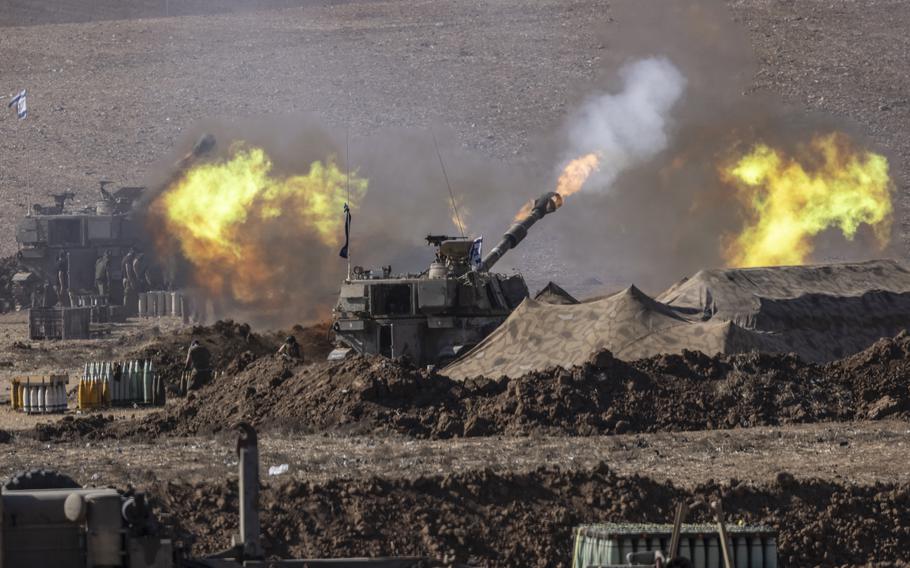
Israeli forces fire artillery toward Gaza on Nov. 6, 2023. (Heidi Levine/for The Washington Post)
A group of civil society organizations urged the Biden administration on Monday to forgo supplying artillery shells to Israel, reflecting the mounting pressure the United States faces over its support for the Israeli campaign against Hamas militants in the Gaza Strip.
In a letter to Defense Secretary Lloyd Austin, more than 30 U.S.-based aid, advocacy and religious organizations including Oxfam America, Amnesty International and the Center for Civilians in Conflict (CIVIC) expressed alarm about the Pentagon’s plan to provide the Israel Defense Forces 155-mm artillery munitions from a special American weapons stockpile in that country.
“Under the current circumstances, granting the government of Israel access to these munitions would undermine the protection of civilians, respect for international humanitarian law [IHL], and the credibility of the Biden administration,” the groups wrote in their letter, a copy of which was obtained by The Washington Post. “Simply put, it is difficult to imagine a scenario in which high explosive 155mm artillery shells could be used in Gaza in compliance with IHL.”
The letter reflects the growing public concern about Israel’s military operation to destroy Hamas, whose militants killed more than 1,000 Israelis and took more than 200 hostages in their Oct. 7 attack, and America’s role supporting that campaign. Palestinian authorities say at least 11,000 have died in the densely populated Gaza Strip as part of Israel’s response to that assault.
Prime Minister Benjamin Netanyahu has defended his government’s conduct, saying Israel is taking steps to protect civilians but must eradicate the group to ensure Hamas cannot conduct similar attacks in the future. As the campaign continues, strikes on medical centers and other civilian sites are generating global outcry.
Since Oct. 7, the Biden administration has rushed military support to Israel, a key regional ally that has been the largest recipient of annual U.S. military aid for decades, and sent two U.S. aircraft carriers to the region in a bid to prevent the conflict from escalating. Military aid provided since the assault under Washington’s direct commercial sales program includes small diameter bombs, kits to make precision-guided munitions and other ammunition.
Officials also have said they would be providing 155mm artillery shells from the War Reserve Stockpile in Israel, which is designed to provide the U.S. military a ready weapons supply in the region and also to give Washington the ability to quickly arm Israeli forces. Previously the Biden administration has tapped that reserve to replenish American stocks in Europe, under stress because of the war in Ukraine.
The Pentagon declined to say whether it has gone ahead with its plan to provide Israel 155mm shells from that reserve.
“While we will not provide specific details on sources and movement of particular munitions, we remain confident in our ability to balance the need to support Israel, Ukraine and our NDS simultaneously,” Deputy Pentagon press secretary Sabrina Singh said in a statement, referring to the U.S. national defense strategy.
The administration has said it expects Israel to conduct its campaign in compliance with international norms and take prudent steps to shield civilians from harm. But it is facing mounting scrutiny, including from within the president’s own party.
A group of 26 Democratic senators last week appealed to President Joe Biden seeking assurances that U.S. support was underpinned by a prudent strategy, and saying that future aid should hinge on factors including Israel’s protection of civilians. Leading Democrats are also pressing Biden for greater transparency about what assistance is being given to Israel, which has been shrouded in greater secrecy than aid to Ukraine.
In their letter to Austin, the groups referenced severely deteriorated humanitarian conditions in Gaza, where residents have been struggling to access food, water and electricity. Israel has allowed some localized pauses in its operations to allow residents to relocate but has rejected calls for a cease-fire unless all hostages are released.
The groups also referenced the U.S. government’s endorsement of a 2022 international declaration aiming to limit the use of explosive weapons in urban areas, and pointed to Israel’s firing of tens of thousands of artillery shells in past conflicts with Hamas in 2008-2009 and 2014.
“These munitions hit schools, neighborhoods, hospitals, shelters, and refugee camps, killing, wounding, and displacing scores of civilians,” the groups wrote. “The Israeli Defense Forces’ (IDF) past use of artillery in Gaza bears out our concerns.”
The Biden administration is seeking approval from Congress to provide $14 billion for additional military aid for Israeli forces and replenishing American arms provided to them in recent weeks.